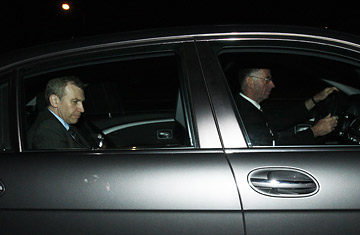
Belgium's Prime Minister Yves Leterme of the Flemish Christian Democrat party (CD&V) is driven from the Belvedere Palace in Brussels after a meeting with Belgian King Albert II
Tuesday morning felt like Groundhog Day for many Belgians, who awoke to discover their Prime Minister had resigned.
Anywhere else, the collapse of the government would be treated with more alarm. In Belgium, it seems like a default mode. The country regularly plunges into periods of political chaos, with its Dutch- and French-speaking communities perpetually poised to pull it apart.
Politicians vied to blame each other for the latest crisis, but there was a weary familiarity about the situation. After elections in June last year, the country muddled through for six months without any government at all; many hardly noticed. A new government was formed in December, but it was only an interim administration. It wasn't until March that the winner of the 2007 elections, Flemish center-right leader Yves Leterme, became Prime Minister of a broad coalition government.
Now, after just four months in the job, Leterme has resigned after failing to meet his own deadline for tying up a package of institutional reforms aimed at giving more autonomy to Belgium's increasingly estranged constituent provinces, French-speaking Wallonia and Dutch-speaking Flanders. King Albert II has yet to accept Leterme's resignation, so he remains a caretaker prime minister.
Leterme said in a statement that the divide between the country's Dutch and French speakers was too deep for a resolution to be reached. "The federal consensus model has reached its limits," he said. But critics on both sides of the linguistic divide pointed to Leterme's own failure to reconcile the parties in his fractious coalition of Conservatives, Socialists and Liberals.
"It clearly is a serious political crisis," says Dave Sinardet, a political scientist at the University of Antwerp. He said Leterme's four months as Prime Minister failed to achieve anything of note, apart from balancing the budget. Meanwhile, the country's economy is slowing and inflation is at its highest in almost 24 years.
But Sinardet said Leterme was wrong to blame the system, as his own Conservative party, the CD&V, had refused to compromise on reforms. "The problem is that there is no alternative: the CD&V are the largest party in Flanders and they are needed in any formula that gets us out of here."
Others have suggested the problem is more profound than a mere party spat. Certainly, there are deep divides between the communities that go beyond mere language. Leterme himself once described Belgium as "an accident of history."
Flanders and Wallonia often seem to have entirely separate economies and cultures, and rarely have much interaction. Flanders, home to 6.5 million, is by far the country's economic dynamo, with a GDP per head of 124% of the EU average compared with just 90% for the 3.5 million in Wallonia.
A recent poll found that 49.7% of Flemish people are in favor of splitting Belgium in two. And many Flemish have become more openly hostile toward French speakers. On the linguistic border, the Flemish towns of Zaventem and Vilvoorde limit social housing to Dutch speakers, while in nearby Overijse, citizens are encouraged to denounce shopkeepers who advertise in languages other than Dutch.
What happens next is unclear. The King is now consulting political leaders on how to resolve the crisis including, significantly, regional politicians. He could call for new elections, or invite another leader to pull together a coalition. But he is more likely to ask Leterme to return, yet postpone major reforms until next June, when federal elections would be held, on the same date as European Parliament and regional elections.
The King is due to announce his plans on next Monday. That is the Belgian national day, which commemorates the coronation of the country's first King, Leopold I, in 1831. The day is usually celebrated with a grand military parade through the center of Brussels. And although Belgians have weathered such crises many times before, they will also wonder how much longer they can expect to be treated to such army displays.
